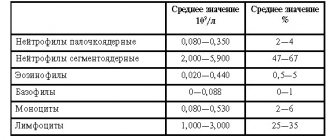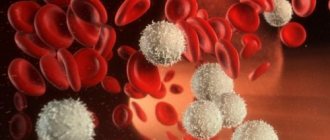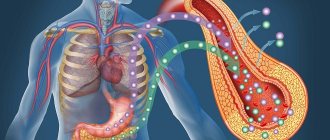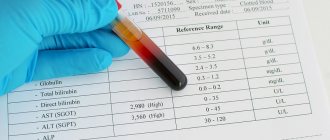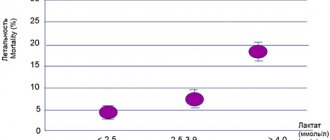Certain types of cancer lead to characteristic changes throughout the body, including at the molecular level. Such changes can be detected using relatively simple laboratory tests for tumor markers. With certain malignant tumors, an increase in one or another indicator is observed. In particular, carbohydrate antigen 125 (or CA-125) makes it possible to suspect ovarian cancer and some other oncological pathology, as well as monitor the patient’s condition after treatment has already been carried out.
Detailed description of the study
CA 125 is a protein that is found on tumor cells of the ovarian epithelium and normally in cells of the endometrium, peritoneum, pleura, pericardium and testicles. It enters the bloodstream, for example, during menstruation, endometriosis, and in the first trimester of pregnancy. The presence of CA 125 does not always indicate an oncological process - small amounts of the protein are produced by various tissues of the body, as well as malignant tumors of other etiologies (endometrium, gastrointestinal tract, fallopian tubes, lungs and gastrointestinal tract). Increased levels of CA 125 in the blood may be associated with pelvic inflammation.
A test for the CA 125 antigen allows you to detect malignant neoplasms of the ovaries or mammary gland at the earliest stage, when changes in the body are minimal and the chances of recovery are highest. It also helps to detect metastases before the onset of clinical manifestations.
General information
CA 125 is a chemical compound of polysaccharide and protein that is an antigen of a certain type of epithelial cell. Normally, a small concentration of the component is present in the cells of the inner layer of the uterus - the endometrium - and in the organ itself as part of some biological fluids. Also, a small amount of CA 125 is secreted by the lining of the abdominal cavity and pleura, epithelial cells of the bronchi, pericardium, gall bladder, intestines, pancreas, kidneys, fallopian tubes, and testes.
A slight increase in CA 125 levels can be observed in expectant mothers in the first trimester of pregnancy or in women during menstrual bleeding. A pathological increase in the concentration of antigen in the blood is recorded in malignant, benign and systemic pathologies. For example, in almost 80% of patients with ovarian cancer, CA 125 values are up to 165 U/ml (with a normal value of up to 35 U/ml). In the first and second stages of cancer, an increase in the indicator is observed in 50% of cases of the disease, but the third and fourth stages are characterized by a persistent increase in the tumor marker in almost every woman. Therefore, the CA 125 test is considered quite specific and indicative, but not suitable for early diagnosis of cancer due to low sensitivity.
The analysis for CA 125 is of greatest importance in determining the dynamics of tumor marker changes, which will allow assessing the effectiveness of the chosen treatment regimen and correctly predicting remission.
References
- TUMOR MARKERS IN BREAST CANCER V.F. Semiglazov, corresponding member of the Russian Academy of Medical Sciences, Doctor of Medical Sciences, Professor V.V. Semiglazov, Doctor of Medical Sciences, Professor G. Dashyan, Candidate of Medical Sciences A. Bessonov, R. Paltuev, Candidate of Medical Sciences, T. Semiglazova, Candidate of Medical Sciences, I. Grechukhina, K. Penkov, A. Vasiliev, A. Manikhas - Candidate of Medical Sciences, Research Institute of Oncology named after. N.N.Petrova, St. Petersburg State Medical University named after. acad. I.P. Pavlova, City Clinical Oncology Dispensary St. Petersburg.
- Baselga J., Tripathy D., Mendelsohn J. et al. Phase II study of weekly intravenous recombinant humanized anti-p185HER2 monoclonal antibody in patients with HER2/neu-overexpressing metastatic breast cancer // J. Clin. Oncol. – 1996; 14: 737–744.
- CobleighM., Vogel C., Tripathy D. et al. Multinational study of the efficacy and safety of humanized anti-HER2 monoclonal antibody in women who have HER2 -overexpressing metastatic breast cancer that has progressed after chemotherapy for metastatic disease // J. Clin. Oncol. – 1999; 17:2639–2648
How CA-125 levels change depending on the stage of cancer
The concentration of the tumor marker may increase with cancer of the uterus, fallopian tubes, breast and some other organs. However, in most cases (about 80%), an increase in CA-125 levels is associated specifically with ovarian cancer. However, the values may vary depending on the stage of the oncological process. One study found that in healthy women, the CA-125 tumor marker is detected at a concentration of 8.9 U/ml, while in patients with stages I-II of ovarian cancer the indicator rises to 88 U/ml, and in stage III and stage IV - up to 409 U/ml. However, it cannot be reliably stated that during cancer, the concentration of CA-125 will increase in all women. This pattern is detected in 40-95% of all cases.
What is SA-125?
CA-125, or mucin-16, carbohydrate antigen 125 is an antigen located on the membranes of ovarian cancer cells.
Ovarian tumors represent a serious gynecological problem in all age groups of patients.
In no other human organ is there such a histological diversity of tumors as in the ovaries.
The CA-125 protein belongs to a specific type of epithelium and is normally found in the endometrial tissue of healthy women of reproductive age.
In this situation, changes in CA-125 depend on the phase of the menstrual cycle: a slight increase in its level is observed during menstruation (especially in the presence of endometriosis), as well as during normal pregnancy during the third trimester.
Physiological is the content of CA-125 in the uterine fluid, while it does not penetrate into the bloodstream. Minimal amounts of the glycoprotein can be found in the mesothelial tissues of the thoracic and abdominal organs. Reference (threshold) protein values in laboratory diagnostics are up to 35 U/ml.
How to take a tumor marker test correctly?
To obtain the most accurate result of a tumor marker test, you need to prepare and adhere to simple but very important rules:
- Blood from a vein must be taken on an empty stomach ; the patient must not eat 8 hours before taking blood for analysis. Only water is allowed among drinks to prevent distortion of results.
- It is better to take the test in the morning , between 8 and 11 o'clock.
- A woman should give up alcohol and smoking at least three days before taking the test.
- Immediately before the test, you need to calm down , because... Nervous strain, along with nicotine and alcohol, can affect the final result.
- For a certain number of days before the analysis, you should not engage in intense physical activity..
- It is necessary to exclude medical procedures (physiotherapy, massages, ultrasound examinations) 3-4 days before the test.
- It is very important to monitor your diet during the week before the test: avoid fatty, fried and spicy foods.
- Consult your doctor about taking medications before the test , because... some of them may affect the result of the analysis.
- If a woman has any inflammatory diseases , the test should be postponed and taken after they are completely eliminated.
- The test cannot be performed during menstruation , because... how this period can be accompanied by a physiological increase in the level of tumor marker in the blood.
If all these rules are followed, the analysis will be clearly and correctly interpreted by the doctor. The result can be expected within 1-2 days after delivery.
What else can the CA-125 tumor marker indicate?
When a high level of protein is initially detected, it is necessary to carry out a qualitative and detailed differential diagnosis with other oncological diseases.
The CA-125 protein is not strictly specific for ovarian cancer; it is also detected in a number of other oncopathologies:
- mammary cancer,
- uterus, endometrium,
- pancreas,
- lungs,
- liver and stomach.
If there are no signs of ovarian cancer on ultrasound, MRI, or histological examination of biopsy material, it is necessary to conduct additional diagnostics of the pathologies of other organs listed above.
Indications
Determination of CA-125 levels is prescribed in the following cases:
- As part of a comprehensive diagnosis of cancer of the ovaries, breast, uterus, fallopian tubes, etc.
- During dynamic observation of patients who have already undergone treatment (evaluation of effectiveness).
- In order to detect relapse.
- Benign neoplasms of the ovaries.
It is worth noting that just determining the level of CA-125 in blood serum is uninformative and low-specific. Therefore, Euroonco specialists always prescribe this analysis in combination with other laboratory and instrumental studies.
CA 125
SA-125
- the main marker of ovarian cancer and its metastases. Tumor marker CA-125 in the fetus in epithelial cells of the respiratory and digestive tract. In adults, as in the fetus, it is formed by epithelial cells of the respiratory tract. Significantly higher levels are found in the serum of pregnant women and in breast milk. CA-125 is present in normal endometrial tissue and in the serous and mucinous fluid of the uterus. It does not enter the bloodstream unless natural barriers are broken down. Serum levels may increase during menstruation, especially with endometriosis. A physiological increase in the marker during pregnancy (1st trimester) is possible.
CA-125 and ovarian cancer
In patients with stage I ovarian cancer, the content of the marker is practically no different from the control, but in stages II, III and IV of the disease, the levels of CA-125 increase significantly. Patients whose CA-125 level decreases in the first 3 months after the start of treatment survive significantly better. In complete remission in the absence of a tumor, the level of CA-125 is close to zero. An increase in CA-125 from zero to 35 U/ml, i.e. within normal limits, may be a preclinical manifestation of a relapse.
Physiological function
It is assumed that during fetal development, CA-125 functions as a differential antigen of caylon substances.
Elevated levels in patients with malignant neoplastic diseases:
- Ovarian cancer.
- Uterine cancer.
- Endometrial cancer.
- Mammary cancer.
- Pancreas cancer.
- Primary liver cancer (has no independent significance).
- Cancer of the rectum and sigmoid colon (no independent significance).
- Stomach cancer (no independent significance).
- Bronchogenic carcinoma (has no independent significance).
- Metastases of the carcinomas presented above in the liver.
An increase in the concentration of CA-125 during remission should be the basis for an in-depth examination of the patient to detect a relapse of the disease.
A persistent increase in CA-125 values indicates tumor progression and poor response to treatment. Elevated levels in diseases of benign etiology:
- Benign diseases of the ovaries and endometrium.
- Leiomyoma.
- Kidney failure.
- Acute pancreatitis.
- Acute hepatitis.
- Cirrhosis of the liver.
- Jaundice.
- Biliary cirrhosis.
- Physiologically during pregnancy.
Recommendations
For women who want to test themselves for cancer, we recommend that they undergo a comprehensive laboratory examination.
Biological half-life:
4 days.
This test has low specificity; according to statistics, a twofold increase in the level of CA-125 in the blood, especially in women over 55 years of age, is a reliable indication of the presence of ovarian cancer. In ovarian and endometrial cancer, a decrease in marker levels indicates a favorable prognosis and a good response to treatment.
Indications:
- diagnosis and monitoring of the progress of treatment of ovarian cancer, primarily of the serous type;
- additional tumor marker for pancreatic cancer (in combination with CA 19-9).
Preparation
It is recommended to donate blood in the morning, between 8 and 11 am. Blood is drawn strictly on an empty stomach or after 4–6 hours of fasting. It is allowed to drink water without gas and sugar. On the eve of the examination, food overload should be avoided.
Interpretation of results
Units of measurement: U/ml.
Increased CA-125 level:
1. Oncopathology:
- ovarian cancer (in 80% of cases);
- uterine cancer;
- endometrial cancer;
- fallopian tube cancer;
- mammary cancer;
- pancreas cancer;
- rectal cancer;
- stomach cancer;
- lungs' cancer;
- liver cancer.
2. Somatic pathology (slight increase):
- cystic formations of the ovaries;
- endometriosis;
- inflammatory diseases of the appendages, gynecological infection;
- peritonitis, pleurisy;
- chronic hepatitis, liver cirrhosis;
- chronic pancreatitis;
- autoimmune pathology.
Tumor markers and their significance
Tumor markers are specific proteins that are produced by malignant tumors or normal tissues in quantities exceeding the permissible limits due to the entry of cancer cells.
They cannot be used to make an accurate diagnosis, but detection of these substances in the blood and/or urine allows:
- suspect cancer and its location;
- distinguish a malignant tumor from a benign one;
- study the effectiveness of tumor therapy;
- detect relapse of the disease early;
- detect metastases before their clinical manifestation.
Who needs to get tested?
- First of all, this test must be taken by every woman who monitors her health. For screening purposes, the analysis is carried out for early detection and most effective treatment of cancer. The sooner an increase in tumor marker levels is detected, the greater the chances of successful treatment of the disease.
- It is important for those women whose relatives have been diagnosed with cancer to undergo the test. For this purpose, it is recommended to carry out the analysis once a year.
- If a woman has previously been diagnosed with benign neoplasms , such as leiomyoma, fibromyoma, functional ovarian cysts, neoplastic lesions, the doctor may prescribe a blood test for tumor markers to diagnose and differentiate tumors.
- It is mandatory for women who have symptoms of a malignant neoplasm to undergo the test. However, do not forget that a positive test for tumor markers is not specific and 100% confirmation of cancer, so additional instrumental research methods (ultrasound, tumor tissue biopsy, MRI) will be prescribed.
- After diagnosing a malignant tumor and carrying out conservative (chemotherapeutic, radiotherapeutic) and surgical (radical removal) treatments, the doctor prescribes repeated blood tests for CA-125 tumor markers. This is done to evaluate the effectiveness of the therapy.
- Subsequent analysis is carried out to identify metastases in distant organs, as well as for the early detection of tumor relapse. To do this, the test is taken monthly in the first year after treatment, then once every 2 months during the second year, and once every 3 months in the third year. In the absence of relapses and metastases, the test is performed 1-2 times a year until the end of the woman’s life.


